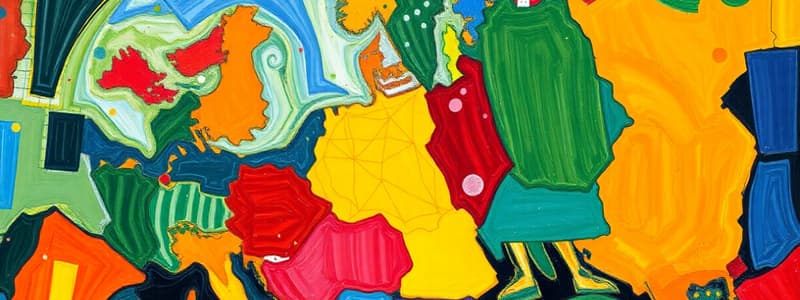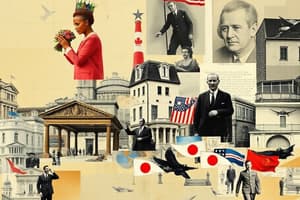Podcast
Questions and Answers
What characterized North Africa in the early 1800s?
What characterized North Africa in the early 1800s?
North Africa was predominantly Muslim and part of the declining Ottoman Empire.
How did the Asante kingdom respond to European exploitation?
How did the Asante kingdom respond to European exploitation?
The Asante kingdom engaged in trade with Europeans and Muslims while dealing with their own internal lack of unity.
What role did Shaka play in Southern Africa?
What role did Shaka play in Southern Africa?
Shaka was a leader who united the Zulu nation and led conquests that triggered migrations and wars.
What was the status of the slave trade in East Africa by the early 1800s?
What was the status of the slave trade in East Africa by the early 1800s?
What was the purpose of the Berlin Conference in 1884?
What was the purpose of the Berlin Conference in 1884?
Who was Dr. David Livingstone, and what was his contribution to African exploration?
Who was Dr. David Livingstone, and what was his contribution to African exploration?
What impact did Belgian King Leopold II have on Africa?
What impact did Belgian King Leopold II have on Africa?
What was the British role in the formation of Sierra Leone?
What was the British role in the formation of Sierra Leone?
What were the primary natural resources exploited in the Congo under Belgian control?
What were the primary natural resources exploited in the Congo under Belgian control?
What event forced King Leopold II to relinquish control of the Congo?
What event forced King Leopold II to relinquish control of the Congo?
What was the outcome of the Boer War for Britain?
What was the outcome of the Boer War for Britain?
How did Emperor Menelik II contribute to Ethiopia's survival against Italian invasion?
How did Emperor Menelik II contribute to Ethiopia's survival against Italian invasion?
What was the significance of the Union of South Africa formed in 1910?
What was the significance of the Union of South Africa formed in 1910?
What was a distinct characteristic of the new African elite emerging in the early 1900s?
What was a distinct characteristic of the new African elite emerging in the early 1900s?
Which African nation, alongside Liberia, was able to maintain its independence during the Scramble for Africa?
Which African nation, alongside Liberia, was able to maintain its independence during the Scramble for Africa?
What major factor led to the French expansion in Africa during the late 1800s?
What major factor led to the French expansion in Africa during the late 1800s?
What are the four primary causes of the new imperialism?
What are the four primary causes of the new imperialism?
How did the Industrial Revolution contribute to new imperialism?
How did the Industrial Revolution contribute to new imperialism?
What role did nationalism play in the new imperialism?
What role did nationalism play in the new imperialism?
Explain the concept of Social Darwinism as it relates to imperialism.
Explain the concept of Social Darwinism as it relates to imperialism.
What weaknesses did non-Western states face that contributed to the success of Western imperialism?
What weaknesses did non-Western states face that contributed to the success of Western imperialism?
Identify two technological advancements that provided advantages to imperialist nations.
Identify two technological advancements that provided advantages to imperialist nations.
Describe the different forms of imperial rule mentioned in the text.
Describe the different forms of imperial rule mentioned in the text.
What were some reasons for resistance against Western expansion in colonized regions?
What were some reasons for resistance against Western expansion in colonized regions?
What criticisms were made against colonialism during the imperial period?
What criticisms were made against colonialism during the imperial period?
How did imperialist nations justify their expansion into non-Western territories?
How did imperialist nations justify their expansion into non-Western territories?
Flashcards
Imperialism
Imperialism
The domination of one country over the political, economic, or cultural life of another country or region.
New Imperialism
New Imperialism
A period of aggressive European expansion in the 1800s, driven by economic, political, military, and ideological factors.
Economic Interests in Imperialism
Economic Interests in Imperialism
A major motivation for Imperialism, driven by the Industrial Revolution's need for resources, new markets, and an outlet for growing populations.
Political and Military Interests in Imperialism
Political and Military Interests in Imperialism
Signup and view all the flashcards
Humanitarian Goals in Imperialism
Humanitarian Goals in Imperialism
Signup and view all the flashcards
Social Darwinism in Imperialism
Social Darwinism in Imperialism
Signup and view all the flashcards
Weakness of Non-Western States
Weakness of Non-Western States
Signup and view all the flashcards
Western Advantages in Imperialism
Western Advantages in Imperialism
Signup and view all the flashcards
Resistance to Western Imperialism
Resistance to Western Imperialism
Signup and view all the flashcards
Colonies and Direct Rule
Colonies and Direct Rule
Signup and view all the flashcards
Asante Kingdom
Asante Kingdom
Signup and view all the flashcards
Scramble for Africa
Scramble for Africa
Signup and view all the flashcards
Berlin Conference
Berlin Conference
Signup and view all the flashcards
Shaka Zulu
Shaka Zulu
Signup and view all the flashcards
Boers
Boers
Signup and view all the flashcards
Paternalism
Paternalism
Signup and view all the flashcards
Dr.David Livingstone
Dr.David Livingstone
Signup and view all the flashcards
Henry Stanley
Henry Stanley
Signup and view all the flashcards
Horrors in the Congo
Horrors in the Congo
Signup and view all the flashcards
British Expansion in South Africa
British Expansion in South Africa
Signup and view all the flashcards
Boer War
Boer War
Signup and view all the flashcards
Apartheid
Apartheid
Signup and view all the flashcards
Ethiopian Resistance
Ethiopian Resistance
Signup and view all the flashcards
New African Elite
New African Elite
Signup and view all the flashcards
Study Notes
New Imperialism and its Causes
- Imperialism is the domination of one country over another's political, economic, or cultural life
- The "New Imperialism" was a period of aggressive European expansion in the 1800s
- Four main causes:
- Economic interests: Industrial Revolution spurred demand for resources and markets, colonies offered outlets for goods and population
- Political and military interests: Needed bases for navies and merchant ships; nationalism and prestige driven by controlling colonies
- Humanitarian goals: Missionaries and doctors believed in spreading Western civilization (medicine, law, and Christianity)
- Social Darwinism: Belief in racial superiority of Europeans; imperial conquest was seen as natural
- Success of Western Imperialism (1870-1914):
- Imperialist nations gained control over much of the world
- Reasons for success included weakness of older civilizations like Ottoman Empire, Mughal India, and Qing China; and strong economies, well-organized governments, powerful militaries, and advanced technology, medical advancements of the West
Forms of Imperial Rule
- Colonies: Direct rule with officials and soldiers sent to administer (French model) or indirect rule empowering local chiefs/leaders (British model)
- Protectorates: Local rulers remained in place but followed European advisors
- Spheres of Influence: Areas where outside powers claimed exclusive investment/trading privileges
Partition of Africa
- Early 1800s: North Africa was part of the declining Ottoman Empire. West Africa saw growth of the Asante kingdom
- The scramble for colonies in Africa: spurred by Belgian King Leopold II's exploration of the Congo River Basin
- Berlin Conference (1884): European powers met to divide Africa without African representation, claiming territory and setting up administrations
Studying That Suits You
Use AI to generate personalized quizzes and flashcards to suit your learning preferences.




